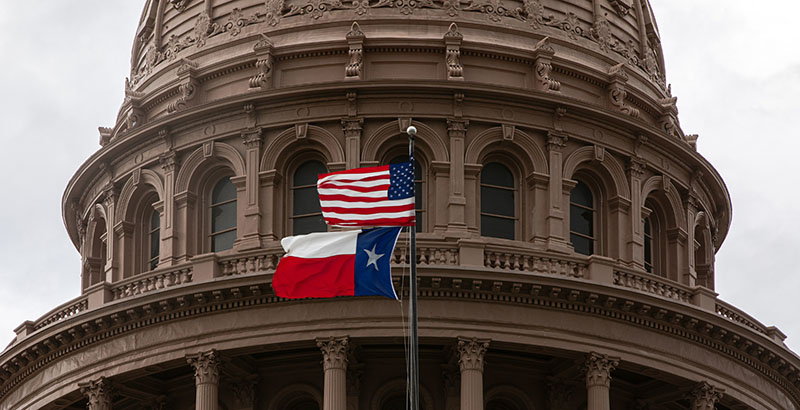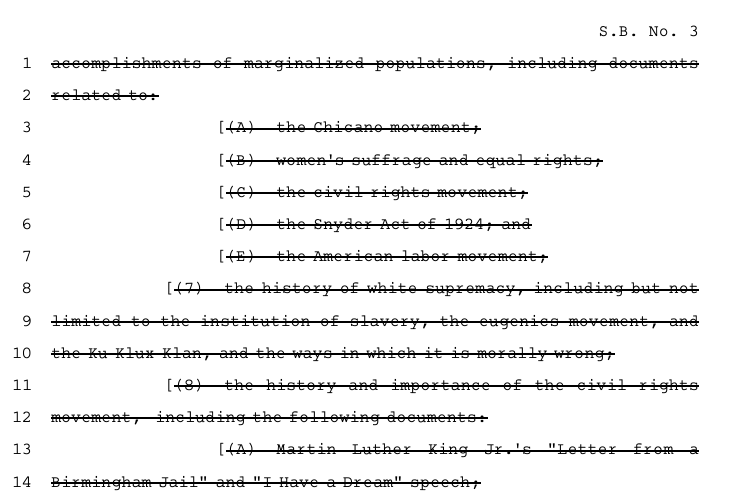In Special Legislative Session, Texas Lawmakers Look to Further Restrict Critical Race Theory in Schools

Get essential education news and commentary delivered straight to your inbox. Sign up here for The 74’s daily newsletter.
Conservative lawmakers wasted no time answering Gov. Greg Abbott’s call to enact further restrictions on how race is taught in relation to the nation’s history in public and charter school classrooms during a special session of the Texas Legislature.
State Sen. Bryan Hughes, R-Mineola, filed Senate Bill 3, which would go beyond House Bill 3979 that lawmakers passed in May. Like that bill, Hughes’ new legislation does not explicitly refer to “critical race theory,” an academic term Republicans in statehouses across the nation have latched onto in recent months.
Critical race theory is an academic framework that examines systemic racism in U.S. laws, policy and society, which Texas teachers say is not taught in K-12 schools.
SB 3 calls for the state education commissioner, who the governor appoints, to create a civics training program for educators that includes “guided classroom discussion of current events.” It also tasks the commissioner with determining the appropriate grade-level for such discussions.
The bill strikes out provisions House Democrats added to HB 3979 by Rep. Steve Toth, R-The Woodlands — which Abbott signed into law last month — that sought to diversify the historical figures and events students learn about, including the Chicano movement; the women’s and civil rights movements; Native American history; and the history of white supremacy, including slavery, and “the ways in which it is morally wrong.”
Georgina Pérez, a Democrat who represents the El Paso area on the State Board of Education, said SB 3 is an effort by Republican lawmakers to “completely erase” people of color, who look like students on the border, and women from the state’s history books.
“You are nothing but a strikethrough” to these lawmakers, Pérez said.
“Could you be any clearer that you only want the history of white dudes” taught to Texas public school students, she added, describing Hughes’ bill as an effort “to force children to learn a version of revisionist history.”

Hughes’ office did not respond to a request for comment on SB 3.
The bill was referred Friday to the Senate State Affairs Committee. A public hearing on it has yet to be set.
Abbott made further cracking down on critical race theory one of his 11 priorities for the special legislative session, which began July 8. A special session can run up to 30 days but Abbott can call as many as he chooses during the interim. The regular session ended May 31.
In a statement last month, Toth’s office called HB 3979 “one of the strongest prohibitions on Critical Race Theory in the country” and said it “promotes harmony in the classroom by prohibiting the teaching of racial superiority or collective guilt.”
The graduate-level theory is not taught at the K-12 level, said Jeffrey Shepherd, the chair of the history department at the University of Texas at El Paso.
“Critical race theory helps us understand how race is socially constructed but (also) reproduced in law and other economic, political, (and) social institutions across the United States,” Shepherd said.
Spokespersons for the El Paso and Socorro Independent School Districts said their districts follow the state social studies standards, known as the Texas Essential Knowledge and Skills, or TEKS, which the State Board of Education sets. The TEKS do not include critical race theory, Pérez said.
SB 3 maintains HB 3979’s ban on teaching that “an individual, by virtue of the individual’s race or sex, is inherently racist, sexist, or oppressive, whether consciously or unconsciously,” or that an individual “bears responsibility for actions committed in the past by other members of the same race or sex.”
It further maintains HB 3979’s language that barrs districts from compelling teachers to discuss current events and social issues.
Toth though filed a new bill Thursday, House Bill 178, to remove that provision from his original bill. Educators who choose to teach current events would still need to “explore the topic from diverse and contending perspectives without giving deference to any one perspective.” HB 178 has yet to be referred to a committee.
Legislation restricting education about racism, which comes in the wake of nationwide protests against police killings of Black Americans, is about more than banning critical race theory, Shepherd said: “(It’s) being used for a broad and somewhat vague and flexible assault on what legislators think is a threat to present day political, social, and racial and gender relations.”
He was one of more than 200 educators and historians who wrote an open letter to the Texas Senate during the regular sessions urging members to vote down HB 3979 and its companion legislation in the Texas Senate.
“Removing lessons that teach students how ideas of race and gender shaped our laws and policies will academically disadvantage students in Texas,” the letter read. “They will not be prepared to take Advanced Placement exams for college credit. They will not have the basic foundation in US history or the analytical skills required for students to succeed in colleges and universities.”
Pérez views Abbott’s focus on critical race theory in the special session as an attempt to pander to his far-right base. The governor is up for re-election in 2022 and faces at least three primary challengers.
“If you want to continue the Texas miracle, it’s going to have to include factual, actual history,” Pérez said. “And with all due respect, if Gov. Abbott thinks teachers in Texas are going to take this with a spoon of sugar, he has lost his ever-loving mind.”
The American Federation of Teachers, one of the country’s largest teachers unions which has chapters in EPISD and SISD, said days before the start of Texas’ special session that it will defend its members who are punished for “teaching honest history.”
This article originally appeared at El Paso Matters.
Get stories like these delivered straight to your inbox. Sign up for The 74 Newsletter

;)